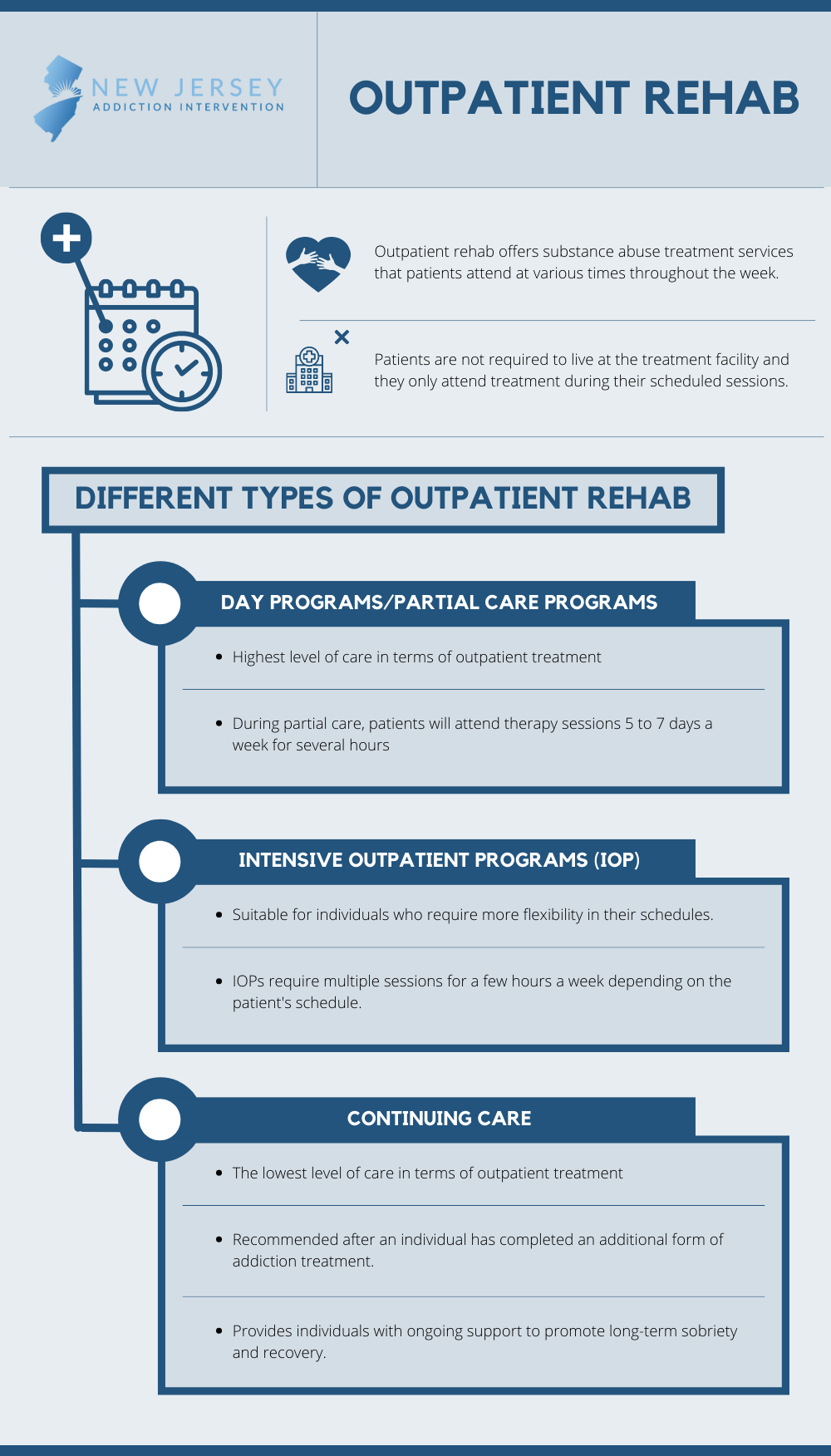The addiction treatment process has several different steps and levels of care that help you transition from structured and supportive living to independent recovery. First, you will likely go through detox and inpatient rehab. Once you have finished inpatient, you may have a couple of different options.
The first option is to consider yourself done with treatment and return home or live in a sober living environment. The other is to enroll in an outpatient treatment program. While you may be eager to start your life in recovery outside of rehab, there are many benefits outpatient rehab programs in New Jersey have to offer. Here is why you should consider an outpatient program after residential treatment.
What is Outpatient Treatment?
Outpatient treatment, also known as outpatient programming or OP, is a type of addiction treatment where you do not live at the treatment facility. Instead, you live at home or in a sober living while attending group therapy sessions 3-5 days each week. This level of care is appropriate for people who have completed residential treatment or those who cannot commit to an inpatient program due to school, work, or family. However, it is not appropriate for people who need inpatient detox services or around-the-clock supervision.
Most outpatient sessions are held in small or large groups discussing relapse prevention, addiction education, and coping mechanisms. Patients are expected to care for their day-to-day responsibilities independently while reporting back to the rehab center during scheduled hours.

Why is Going to Outpatient Rehab After Inpatient Important?
Recovery is not an event that happens overnight. It is a long-term process during which a person grows and continues to better themselves while abstaining from drugs, alcohol, and addictive behaviors. Addiction treatment centers offer multiple levels of care that become less and less intense as you progress in your recovery. And, transitioning from one level of care to the next helps reduce some of the challenges surrounding early recovery.
Perhaps the most difficult transition when it comes to recovery is the changes that take place when leaving residential treatment. Inpatient rehab centers in New Jersey provide around-the-clock care and support that make for a structured and sober environment. This type of setting is ideal for early recovery, however, it is not suitable forever. You must eventually learn how to live independently while managing your sobriety with the resources that are available to you. Outpatient rehab can help you achieve this by facilitating treatment on an outpatient basis that helps you stay accountable, sober, and healthy.
Early recovery can be full of many obstacles. You may struggle to deal with boredom on the weekends, find it difficult to obtain employment, or face numerous external triggers that you are not prepared to deal with. By going to outpatient after residential treatment, you can continue receiving the appropriate level of support that will help you get through these challenges.
How Can I Benefit From Outpatient After Residential Treatment in New Jersey?
Residential treatment programs provide the highest level of care you can go to for addiction treatment. These programs are highly structured and individualized so they are correlated with better treatment outcomes. However, going to outpatient after residential treatment can further increase your chances of staying sober. In fact, research studies have found that patients who complete a higher level of care then step down to outpatient programs demonstrate an increased capability to change in positive ways, remain abstinent, and use relapse prevention skills.
There are many different ways outpatient programs in New Jersey promote long-term recovery. Some of the ways you can benefit from going to outpatient after residential treatment include:
- Having an opportunity to practice relapse prevention skills and identify relapse triggers
- Learning how to stop a slip from turning into a full-blown relapse
- Having support during difficult times or when experiencing painful emotions
- Learning new coping and problem-solving skills
- Working on improving communication skills and interpersonal relationships
- Learning how to identify and meet your vocational or educational needs
- Having accountability to making and sustaining positive life changes
- Having support for family, friends, and other relationships
Outpatient programs can also introduce you to additional community resources that will help support your recovery. They can help you find local 12-step meetings, sober living residences, medication management, and one-on-one mental health counseling.
Find an Outpatient Rehab in New Jersey Today
Here at New Jersey Interventions, our team is fully dedicated to helping you transfer from one level of care to the next with success. We know that addiction does not develop overnight – and it also cannot be cured overnight, either. We can connect you with licensed and accredited addiction treatment centers in New Jersey that offer a full continuum of care with your best interests in mind.
Don’t wait any longer. Call now to find help for addiction.
Medically Reviewed: June 25, 2021

All of the information on this page has been reviewed and verified by a certified addiction professional.

